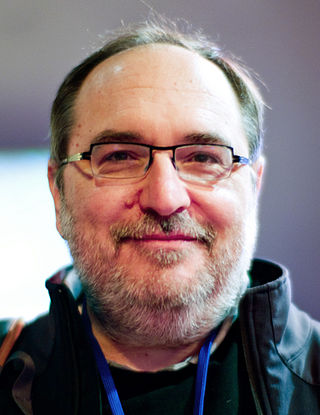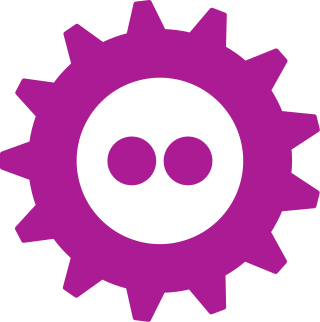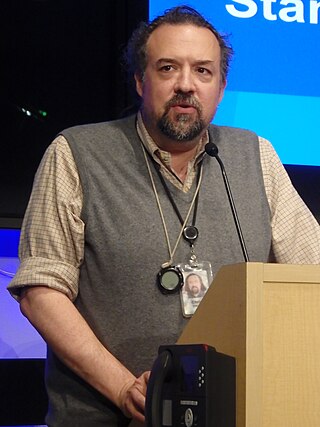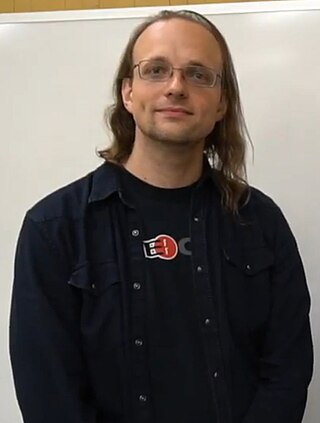
Dave Winer is an American software developer, entrepreneur, and writer who resides in New York City. Winer is noted for his contributions to outliners, scripting, content management, and web services, as well as blogging and podcasting. He is the founder of the software companies Living Videotext, Userland Software and Small Picture Inc., a former contributing editor for the Web magazine HotWired, the author of the Scripting News weblog, a former research fellow at Harvard Law School, and current visiting scholar at New York University's Arthur L. Carter Journalism Institute.

Free software, libre software, libreware sometimes known as freedom-respecting software is computer software distributed under terms that allow users to run the software for any purpose as well as to study, change, and distribute it and any adapted versions. Free software is a matter of liberty, not price; all users are legally free to do what they want with their copies of a free software regardless of how much is paid to obtain the program. Computer programs are deemed "free" if they give end-users ultimate control over the software and, subsequently, over their devices.
The free software movement is a social movement with the goal of obtaining and guaranteeing certain freedoms for software users, namely the freedoms to run, study, modify, and share copies of software. Software which meets these requirements, The Four Essential Freedoms of Free Software, is termed free software.

Jonathan Edward James Bacon is a writer and software engineer, originally from the United Kingdom, but now based in California. He works as a consultant on community strategy.

Free and Open source Software Developers' European Meeting (FOSDEM) is a non-commercial, volunteer-organized European event centered on free and open-source software development. It is aimed at developers and anyone interested in the free and open-source software movement. It aims to enable developers to meet and to promote the awareness and use of free and open-source software.

Free and open-source software (FOSS) is software that is available under a license that grants the right to use, modify, and distribute the software, modified or not, to everyone free of charge. The public availability of the source code is, therefore, a necessary but not sufficient condition. FOSS is an inclusive umbrella term for free software and open-source software. FOSS is in contrast to proprietary software, where the software is under restrictive copyright or licensing and the source code is hidden from the users.

Benjamin Mako Hill is a free software activist, hacker, author, and professor. He is a contributor and free software developer as part of the Debian and Ubuntu projects as well as the co-author of three technical manuals on the subject, Debian GNU/Linux 3.1 Bible, The Official Ubuntu Server Book, and The Official Ubuntu Book.

Chris DiBona was the director of open source at Google from August 2004 until January 2023.

The history of free and open-source software begins at the advent of computer software in the early half of the 20th century. In the 1950s and 1960s, computer operating software and compilers were delivered as a part of hardware purchases without separate fees. At the time, source code—the human-readable form of software—was generally distributed with the software, providing the ability to fix bugs or add new functions. Universities were early adopters of computing technology. Many of the modifications developed by universities were openly shared, in keeping with the academic principles of sharing knowledge, and organizations sprung up to facilitate sharing.
Vendor relationship management (VRM) is a category of business activity made possible by software tools that aim to provide customers with both independence from vendors and better means for engaging with vendors. These same tools can also apply to individuals' relations with other institutions and organizations.
Christopher Locke was an American business analyst, consultant, journalist, author and speaker. He is known as a coauthor of The Cluetrain Manifesto, and author of two other books: Gonzo Marketing: Winning Through Worst Practices, and The Bombast Transcripts: Rants and Screeds of RageBoy. In a Financial Times Group survey from 2001, Locke was named as one of the fifty leading business thinkers in the world.

Brian Aker, born August 4, 1972, in Lexington, Kentucky, US, is an open-source hacker who has worked on various Apache modules, the Slash system, and numerous storage engines for the MySQL database. Aker was Director of Architecture at MySQL AB until it was acquired by Sun Microsystems. He led Sun's web scaling research group, where he worked on the Drizzle database project. He later became a Distinguished Engineer for Sun Microsystems. After leaving Sun when Oracle acquired it, he became the CTO of Data Differential and provided support to open source projects such as libmemcached, Gearman and the Drizzle database project. Aker is currently a Fellow and VP at Hewlett Packard Enterprise.
The intention economy is an approach to viewing markets and economies focusing on buyers as a scarce commodity. Customers' intention to buy drives the production of goods to meet their specific needs. It is also the title of Doc Searls book: The Intention Economy: When Customers Take Charge published in May, 2012.

The Cluetrain Manifesto is a work of business literature collaboratively authored by Rick Levine, Christopher Locke, Doc Searls, and David Weinberger. It was first posted to the web in 1999 as a set of ninety-five theses, and was published as a book in 2000 with the theses extended by seven essays. The work examines the impact of the Internet on marketing, claiming that conventional marketing techniques are rendered obsolete by the online "conversations" that consumers have and that companies need to join.

David Weinberger is an American author, technologist, and speaker. Trained as a philosopher, Weinberger's work focuses on how technology — particularly the internet and machine learning — is changing our ideas, with books about the effect of machine learning’s complex models on business strategy and sense of meaning; order and organization in the digital age; the networking of knowledge; the Net's effect on core concepts of self and place; and the shifts in relationships between businesses and their markets.

Jay Ryan Freeman is an American businessman and software engineer. He is known for creating the Cydia software application and related software for jailbroken iOS—a modified version of Apple's iOS that allows for the installation and customization of software outside of the regulation imposed by the App Store system.
The O'Reilly Open Source Award is presented to individuals for dedication, innovation, leadership and outstanding contribution to open source. From 2005 to 2009 the award was known as the Google–O'Reilly Open Source Award but since 2010 the awards have only carried the O'Reilly name.

In April 2012, Doc Searls' book The Intention Economy: When Customers Take Charge was published. Searls coined the term intention economy in a March 2006 article for Linux Journal. He wrote: "The Intention Economy grows around buyers, not sellers. It leverages the simple fact that buyers are the first source of money, and that they come ready-made. You don't need advertising to make them."

Nextcloud is a suite of client-server software for creating and using file hosting services. Nextcloud provides functionality similar to Dropbox, Office 365 or Google Drive when used with integrated office suites Collabora Online or OnlyOffice. It can be hosted in the cloud or on-premises. It is scalable, from home office software based on the low cost Raspberry Pi, all the way through to full sized data centers that support millions of users. Translations in 60 languages exist for web interface and client applications.














